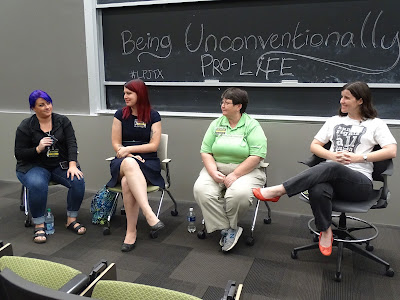The State of the Abortion Debate in Poland
[Today’s guest post is by SPL supporter Sylwia Gryciuk. She lives in Wrocław and is 25 years old.]
It is a popular myth of our times that free access to abortion reflects society’s high level of cultural development. Another widely adopted view holds that we – as human civilization – gradually struggle towards greater equality and thus respect for (broadly understood) human rights. There are some exceptions, of course, as certain communities divert from the expected path, stripping their members of the previously held rights.
Such narrative was mostly favored by the Western media reporting on recent events in Poland: on October 3 around 100k women nationwide excused from work and dressed in black to protest on the streets against the bill proposal which – in the highly unlikely event of its adoption – would nearly completely ban legal access to abortion in the country, leaving the physicians room for medical intervention only if women’s life was in imminent danger. Considering the already strict pregnancy termination laws in Poland (abortion is only allowed in the cases of danger to woman’s life/health, fetal anomalies and rape/incest), many ordinary foreign commentators lamented Polish women’s situation, perceiving it as a reflection of oppressive government’s violation of women’s rights. As it often turns out, the truth is much more complex and even basic research into the history of Polish abortion law proves that the modern pro-“choice” mindset largely depends on distorted – if not deceitful – historical narratives.
At first and very superficial glance it may appear that in Poland the moral evaluation of abortion should be more or less a settled question. Poland is an ethnically and religiously homogenous country with roughly 93% of its population being nominally Catholic; even though mere 40% of them are church-goers, only 6% of the population as a whole declare themselves to be non-believers. Taking into account the Catholic church’s staunch and consistent opposition to abortion in all cases expect danger to mother’s life, one might expect to find the reflection of this position in the opinions of the church’s Polish members. Indeed, recent studies reveal that 75% of Poles oppose legalization of abortion on demand, that is the abortion of healthy embryos and fetuses carried by healthy women. The percentage dramatically shifts though in the cases of less desirable pregnancies: 73% of respondents support legal access to abortion in the event of rape or incest, with mere 11% voicing their opposition, while the legal access to abortion due to fetal anomalies is approved by 53% of the respondents and condemned by only a third.
The findings unsurprisingly show that even though the moral stances of religious authorities do to some extent correlate with the values held by their communities, the majority of the population tend to develop their conscience independently when it comes to critical moral issues. Among other things, it shows that there indeed is a place and a need for secular opposition to abortion even in communities with strong religious component to their identities. Its lack inevitably leads to primitive ideological war in which the unborn children – the ones who should remain in the forefront – are often pushed to the background.
Indeed, the public debate on abortion in Poland has often been reduced to a manifestation of deeply held prejudice and destructive hate. It is not uncommon for the Polish mainstream media to organize quasi-discussions on abortion with a priest representing the pro-life movement and a radical feminist (boasting about the abortion she allegedly underwent on an important Catholic holiday) on the pro-choice side. The outcome is obviously a disaster, with many ordinary people refusing to take a definite stance on the issue of abortion which they view as a red herring, diverting attention from the “real” problems Poland faces. But the problem of abortion in its legal dimension has in Poland a long and thought-provoking history whose importance is often trivialized.
The controversial bill draft which resparked the national debate was prepared by Ordo Iuris Institute for Legal Culture – a secular and independent foundation self-described as: “[gathering] academics and legal practitioners aiming at promotion of legal culture based on the respect for human dignity and rights.” The petition to have the draft considered by the Polish Parliament was subsequently signed by nearly 500k adults eligible for voting, which is quite an impressive number for the country with the population of 38 millions. Sadly, deeper research reveals Ordo Iuris is a highly conservative organization opposing not only abortion but also sex education and homosexual unions – a view which not only alienates more liberally-minded pro-lifers but also in many people’s minds waters down the abortion issue to a politically and religiously motivated battle. In consequence, on October 3 it was not uncommon to see protestors holding signs attacking Catholic church and current conservative government, even though neither was officially involved in the preparation of the draft bill. The protests also floated Polish Internet with memes and satirical drawings representing both sides of the abortion argument. One of the recurrent motifs was… Adolf Hitler. A popular tongue-in-cheek meme says: “Hitler was fighting for Polish women’s right to abortion before it was cool”. As propagandist as this may sounds to some, the meme’s message is backed by historical facts.
 |
| Above: an anti-abortion meme that circulated in Polish social media. Its English translation: “Hitler was fighting for Polish women’s right to abortion before it was cool.” |
Poland is quite unique among other European countries in that in the course of the last 70 years its abortion laws have not been growing more liberal but restricted. The current law, the so-called “abortion compromise” came to force in 1993 after Poland has (at least officially) stopped being a puppet state of the former USRR and started seemingly regaining its own political and cultural identity. Under communist regime, abortion in Poland was additionally allowed in the case of difficult economical situation of the pregnant woman (but in practice it was easily available on request). Only once in the history of the country was abortion on demand ever legally obtainable and this was in the Nazi-occupied Poland. In the pro-choice revisionist history of the Nazi regime Hitler’s ban on abortion for German women is a crystal-clear example that abortion restrictions go in pair with totalitarianism and disrespect for human rights. The truth points in quite a different direction, though. In all fairness, the abortion ban in the Nazi Germany was not initiated by the ruling class’s concern for life, but rather the pragmatic desire to expand the German population. For the regime exterminating the disabled and minorities the concept of human rights simply does not exist. This is exactly why on various occasions abortion appears to them as an attractive tool of genocide as well.
For Poles it is widely known fact that the Nazis viewed Slavs as subhumans and intended on exterminated a significant number of them to subsequently turn the rest into a nation of slaves. Eventually, nearly 20% of Polish citizens lost their lives in the course of World War II. Most of them were civilians and about a half were ethnic Poles whose relatives are now the vast majority of Poland’s population. Importantly, this shocking number still does not include the victims of legally obtainable unrestricted abortion.
In order to be ideologically consistent, supporters of legal abortion should conclude that in 1943 Hitler’s regime granted Polish women fundamental reproductive right which their own pre-war government had denied them. Considering all the atrocities that Polish citizens suffered at the hands of the Nazis to say so would be beyond embarrassing, if not downright offensive. Granting free access to abortion in the war-torn Poland was obviously motivated not by concern for women’s rights, by rather by lack of any respect for the lives of Polish women and children on the part of the occupants. It was Hitler himself who concluded that:
In view of the large families of the Slav native population, it could only suit us if girls and women there had as many abortions as possible. We are not interested in seeing the non-German population multiply…We must use every means to install in the population the idea that it is harmful to have several children, the expenses that they cause and the dangerous effect on woman’s health… It will be necessary to open special institutions for abortions and doctors must be able to help out there in case there is any question of this being a breach of their professional ethics.
A statement chilling mostly because of how reminiscent it is of the current policies and viewpoints related to abortion.
Frederica Mathewes-Green, a pro-life feminist, once famously wrote: “No one wants an abortion as she wants an ice-cream cone or a Porsche. She wants an abortion as an animal, caught in a trap, wants to gnaw off its own leg.” For many desperate Polish women caught in the trap of World War II legal abortion on demand offered by ruthless occupants might indeed seem like the only way out of their miserable situation. But would anyone in their right mind claim that the Nazis gave Polish women a right to choose? Comparing the life in the worn-torn areas to the relative luxury of first-world countries seems disrespectful to say the least but in truth, individual people of every cultural and historical background experience their private tragedies, sometimes pushing them towards abortion which they perceive as the only way out of their problems. It is nothing but revisionist narratives though which make some of us claim that by undergoing abortions these fearful women are executing their right to choose or that politicians who introduce a law allowing women to kill their unborn offspring are by definition mindful of the lives of women and children. Sadly, we often quickly forget the valuable lessons of history and turn to tenuous ideologies instead. It should not surprise us then that there are Polish women (and men) who genuinely believe that support for abortion on demand equals support for freedom and compassion.




Leave a Reply
Want to join the discussion?Feel free to contribute!